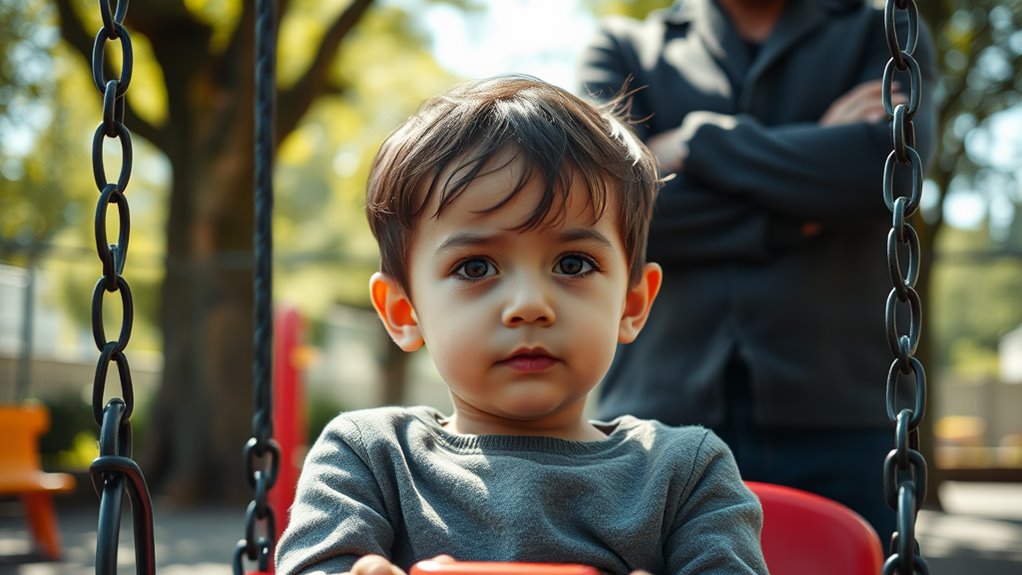Why Helicopter Parenting Could Be Hurting Your Child!
Helicopter parenting can hurt your child by stifling their independence and emotional growth. When you constantly intervene, they miss important chances to learn problem-solving skills and build self-esteem. This overprotection prevents them from experiencing age-appropriate risks necessary for developing resilience. Without the freedom to navigate challenges, they might struggle with anxiety and have difficulty making decisions. Moreover, limited peer interactions can hinder their social skills. Finding a balance between guidance and independence is crucial for their overall well-being. If you’d like to discover effective strategies for fostering resilience and self-reliance, there’s more to explore.
Definition of Helicopter Parenting
Helicopter parenting refers to an overprotective style of parenting where adults closely monitor and control their children’s activities and decisions. You might recognize this in parents who hover over their kids, always ready to swoop in and intervene. They often make decisions for their children, whether it’s choosing their friends, picking their extracurriculars, or even handling their homework. This approach can stem from a desire to shield children from failure or disappointment, but it can also limit their independence and problem-solving skills.
In this parenting style, boundaries are often blurred. Instead of allowing kids to navigate challenges on their own, you may find that parents are constantly stepping in, preventing natural consequences from taking place. This behavior can create an environment where children feel anxious and uncertain, lacking the confidence to make decisions on their own.
While the intention behind helicopter parenting is often rooted in love and concern, it can lead to a host of issues. You might notice that, over time, children may struggle to develop resilience, self-reliance, and the ability to cope with life’s challenges. Understanding this definition is crucial to recognizing its potential pitfalls.
Impact on Child Development
Over time, the effects of helicopter parenting can really weigh on a child’s development. When you constantly hover over your child, you may unintentionally hinder their growth in several crucial areas. Here are some key impacts you should consider:
-
Emotional Regulation: Children might struggle with managing their emotions, as they haven’t had the chance to navigate challenges independently.
-
Problem-Solving Skills: If you always step in to resolve conflicts or make decisions for them, they may lack the ability to think critically and solve problems on their own.
-
Social Skills: Excessive involvement can limit your child’s opportunities to interact with peers, which is essential for developing social skills and forming relationships.
-
Self-Esteem: Your child may develop low self-esteem if they perceive that they can’t succeed without your assistance, leading to a reliance on your support rather than confidence in their abilities.
Ultimately, while your intentions are rooted in love and protection, it’s vital to recognize that giving your child room to grow is essential for their overall development. Balancing support with independence fosters resilience and prepares them for the challenges ahead.
Effects on Independence
Hovering too closely can significantly impact your child’s independence. When you constantly intervene in their decisions or shield them from challenges, you might unintentionally stifle their ability to think for themselves. Your child needs opportunities to make choices, learn from mistakes, and develop problem-solving skills. If you’re always stepping in, they may struggle to navigate the world confidently.
Think about it: when you handle everything for your child, they miss out on critical experiences that foster independence. Whether it’s managing school projects, resolving conflicts with friends, or figuring out daily responsibilities, these tasks help them build self-reliance. If you don’t allow them to face these situations, they may grow up feeling incapable and anxious when confronted with challenges.
Encouraging independence isn’t just about letting go; it’s also about guiding them from a distance. Allow your child to take age-appropriate risks and make decisions. This way, you’re not just protecting them; you’re empowering them. By stepping back, you give them the space to learn, adapt, and thrive, ultimately shaping them into resilient individuals ready to tackle life on their own terms.
Emotional Well-Being Concerns
While nurturing independence is vital for your child’s growth, it’s equally important to consider how excessive involvement can affect their emotional well-being. When you hover too closely, your child may struggle to develop essential coping skills, which can lead to long-term emotional challenges. Here are some key concerns to keep in mind:
-
Anxiety: Children may become anxious when they feel they can’t handle situations without your help, leading to a fear of failure.
-
Low Self-Esteem: Constantly stepping in can send the message that you don’t trust their abilities, causing them to doubt themselves.
-
Difficulty with Decision-Making****: If you always make choices for them, they’ll struggle to make their own decisions, which is crucial for emotional resilience.
-
Overreliance on External Validation*: *Helicopter parenting can foster a need for approval from you and others, making it hard for your child to feel confident in their own judgment.
To promote emotional health, try to strike a balance between support and giving your child space to explore and learn from their experiences. This will help them thrive emotionally and become more independent.
Social Skills and Relationships
Building strong social skills is essential for your child’s development, yet helicopter parenting can hinder their ability to form meaningful relationships. When you constantly intervene in your child’s interactions, you may unintentionally prevent them from learning vital skills like conflict resolution and effective communication.
By stepping in too often, you’re not allowing them the space to navigate social situations on their own. Kids need to experience both successes and failures to understand how to relate to others. Without opportunities to practice, they might struggle with basic social cues and building friendships.
Your child might become overly reliant on your guidance, leading to anxiety when faced with social challenges without your presence. This can result in feelings of inadequacy, making them hesitant to engage with peers.
Encouraging independence is crucial. Instead of managing every aspect of their social life, let them make their own decisions about friendships and conflicts. Support them from a distance, so they can develop the confidence needed to forge connections. Remember, fostering their social skills today will help them thrive in relationships tomorrow.
Signs of Helicopter Parenting
One of the first signs of helicopter parenting is when you find yourself constantly stepping in to solve your child’s problems, whether at school or in social settings. If you notice these behaviors, it might be time to reassess your parenting style:
-
Over-involvement in Homework: You often complete assignments for your child to ensure the best grades, rather than letting them struggle and learn from mistakes.
-
Intervening in Friendships: You feel the need to mediate conflicts between your child and their friends instead of allowing them to navigate social issues on their own.
-
Constant Monitoring: You check your child’s grades or social media frequently, feeling anxious if you don’t know what they’re up to at all times.
-
Decision-Making Control: You make choices for your child, from extracurricular activities to what they wear, rather than encouraging them to express their own preferences.
Recognizing these signs can help you understand the impact of your involvement on your child’s independence and growth. It’s essential to strike a balance that allows your child to develop their own problem-solving skills and confidence.
Strategies for Balanced Parenting
Finding the right balance in parenting can feel like walking a tightrope, but it’s essential for your child’s growth. To achieve this balance, start by setting clear boundaries. Let your child know what’s expected of them and what behaviors are unacceptable. This gives them a sense of security while encouraging independence.
Next, practice open communication. Encourage your child to express their thoughts and fears without judgment. By listening actively, you show them that their feelings matter, fostering a strong emotional connection.
Also, give your child opportunities to make decisions. Start small, allowing them to choose their outfits or snacks. Gradually increase their responsibilities as they grow, which will build their confidence and problem-solving skills.
Additionally, model resilience. Share your own challenges and how you overcame them. This teaches your child that setbacks are part of life and how to handle them without your constant intervention.
Finally, take time for yourself. A well-balanced parent is more present and patient. Remember, it’s okay to let your child navigate some situations on their own. This will cultivate their independence while reinforcing your supportive role in their lives.
Frequently Asked Questions
What Are the Long-Term Effects of Helicopter Parenting on Adult Relationships?
Helicopter parenting can lead to trust issues and dependency in adult relationships. You might struggle with boundaries and communication, making it hard to form healthy connections. Developing self-sufficiency and resilience is crucial for lasting partnerships.
How Can I Identify if I’m a Helicopter Parent?
You can identify if you’re a helicopter parent by observing your tendency to excessively control your child’s activities, constantly intervene in their problems, or fear letting them face challenges independently. Reflect on your parenting style honestly.
What Is the Role of Technology in Helicopter Parenting?
Technology often enables you to monitor your child’s activities closely, making it easy to hover. While it helps keep them safe, it can also stifle independence and problem-solving skills, leading to reliance instead of self-sufficiency.
Are There Specific Age Groups More Affected by Helicopter Parenting?
Helicopter parenting tends to impact younger children and teenagers most. During these crucial development stages, over-involvement can stifle independence, hinder social skills, and create anxiety, ultimately affecting their self-esteem and ability to navigate challenges.
Can Helicopter Parenting Affect Academic Performance?
Yes, helicopter parenting can negatively impact academic performance. When you overly control your child’s studies, they may struggle with independence and problem-solving skills, ultimately hindering their motivation, confidence, and ability to tackle challenges effectively.





